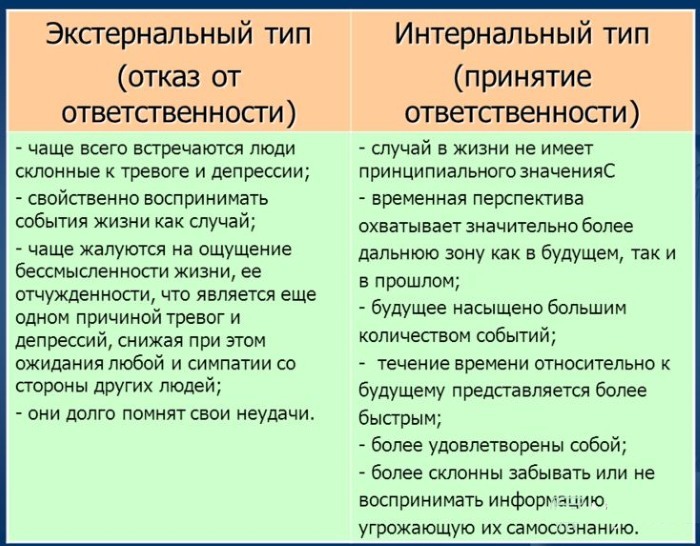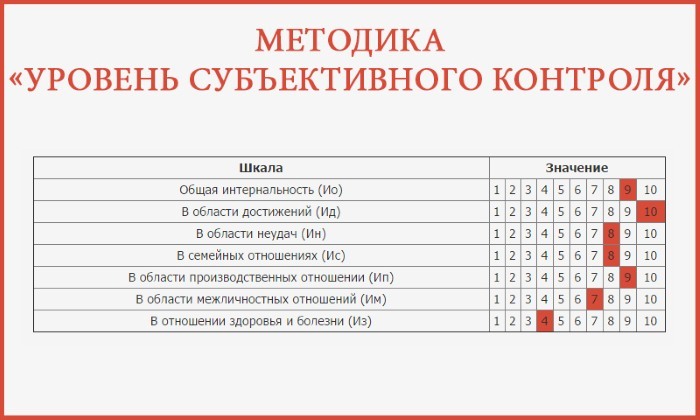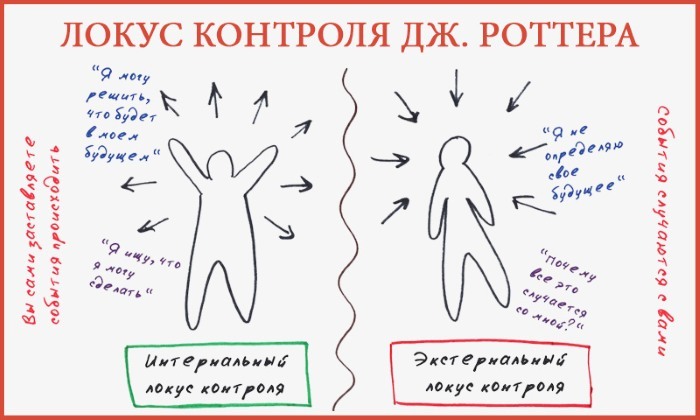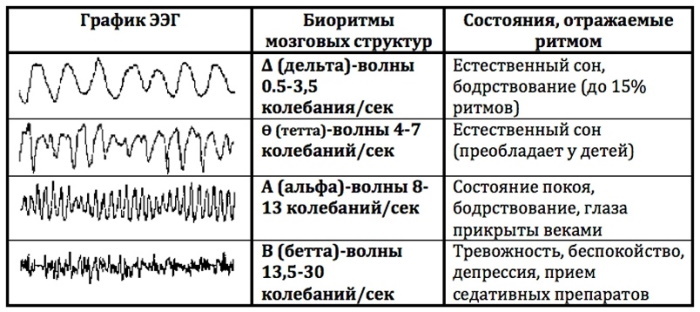Content
- The concept of internality in psychology
- Internality characteristics, examples
- In the field of achievements
- In the area of failure
- In family relationships
- In the field of industrial relations
- In the field of interpersonal relations
- With regard to health and disease
- Internal or external personality test
- Theoretical and methodological approaches to understanding internality as a psychological phenomenon
- Features of the internal locus of control of adolescents in the educational sphere
- Manifestations of internality in addictive behavior
- Features of the leading values and their relationship with internality in adolescence and adulthood
- Locus of Control Video
Internality determines the type of personality in psychology. This mechanism testifies to the adequacy of human perception of reality. Test results (low or high) indicate the level of human adaptability to external factors.
The concept of internality in psychology
Internality is considered a psychological phenomenon of human behavior.
The following keywords are used to characterize the term:
- regulation of personal behavior;
- sovereignty;
- self-determination;
- responsibility;
- subjectivity;
- uncertainty of the choice of a person as a person;
- locus of control.
Internality helps to understand how various psychological processes take place that allow a person to master his behavior and learn to control himself. The term was introduced into circulation by J. Rotter. He believed that the locus of control is the most important behavioral subjective factor that requires analysis: a person must understand the relationship between desires and behavior.
People who are interns are capable of:
- assess reality soberly;
- practically and realistically evaluate the results and monitor the course of action;
- to implement the intended goals.
 Interns pay attention to discipline. They set goals in advance, plan, prepare for this or that business. Internals know how to work with information (including its distribution and processing).
Interns pay attention to discipline. They set goals in advance, plan, prepare for this or that business. Internals know how to work with information (including its distribution and processing).
Internality characteristics, examples
BUT. M. Etkind, S. And Golynkina and E. F. Bazhin developed the USK technique, which became widespread. It differs from the “Scale of Extremity and Internality” developed by JJ. Rotter in 1965.
The internals are characterized by a locus of control. It can be considered a universal feature that manifests itself to varying degrees depending on the situation and events. The local type of control helps to understand how the individual will react to failures in various areas of achievement.
Research scales in the field:
- health and disease;
- interpersonal relationships;
- industrial relations;
- failures;
- family relationships;
- achievements.
The degree of personal development can be measured by the scale indicators.
In the field of achievements
Internality in psychology is an integral characteristic of a personality. Studies were conducted in which 100 people took part. In the area of achievement, internality is noted in 33%. High scores indicate the ability of people to go towards their goals. They can adequately assess their own capabilities and vary the degree of control over positive emotionally events.
Low scores indicate irritability, incontinence. 67% of the subjects are not able to independently complete a complex or uninteresting assignment. They must be motivated to do so by those around them. People who have received a low result realize their own helplessness. Experts sometimes associate this with childhood. The need to organize work and one's own life can be weakened in view of the long stay in boarding schools or rehabilitation centers.
In the area of failure
In 13% of the subjects, internality is found in the sphere of failures. High scores indicate the ability of people to control the situation and the degree of responsibility for their actions. Internals are not used to complaining about fate; they really assess their own strengths.
Low indicators indicate the desire of the subjects to be guided by external control. A protective reaction in this case is developed in a person in a timely manner. Subjects who receive a low score are usually morally unstable. Their emotional and volitional qualities are partially developed. A person cannot be held responsible for his actions and tries to shift the blame for failures onto others.
In family relationships
Tests that were carried out for internality in the field of family relations make it possible to judge whether a person has a sense of responsibility for the atmosphere in the family.
High rates indicate that for 7% of the subjects, the family is the primary model, thanks to which the following were formed:
- style of relationship to each other;
- behavioral reactions;
- feminine and masculine qualities (including ideas about standards and ideals).
Adolescents carry on certain patterns of interaction with parents and siblings into adulthood. If the microclimate in the family is favorable, then young people correctly understand how to behave with their spouses and children. Their family and household relations are built correctly, all duties and rights are respected.
Low rates were found in boarding school pupils or in children who had been in rehabilitation centers for a long time. They do not understand how to behave with a spouse. Understanding the functions of women and men in society is not available to them. The process of the formation of sexual self-identification is also disrupted.
In the field of industrial relations
Internality in psychology includes several concepts. This is sovereignty, subjectivity and responsibility. Testing allows you to identify the degree of control that a person exercises over himself in a production environment. High scores indicate the ability to assess relationships with colleagues and management.
Internals are responsible for their actions. They are assured of success in educational activities and work. Most often, these people are professionally self-determined from a young age: they clearly know which educational institution they will enter, what kind of education they want to receive. Typically, industrial relationship internality tests are conducted among adolescents. Large companies at the stage of registration may require the applicant to undergo psychological testing.
In the field of interpersonal relations
Testing for interpersonal relationships is carried out in order to determine internality. It helps to identify the degree of responsibility of the subject, his ability and desire to build relationships with others. High results were obtained by 33 people out of 100 subjects.
A low control score indicates a lack of ability in people to master their actions, moods and behavior. Most often, this indicator is detected in a person who, in childhood and adolescence, experienced a lack of adequate communication. Aggressively negative attitude towards others becomes stable. People are not able to build adequate and constructive relationships with colleagues, family members.
With regard to health and disease
Internality in psychology is a locus of control. Testing is carried out in order to identify the degree of responsibility of the subject for his own well-being and health. High rates were obtained by people who take full responsibility for their lives. They consider the main causal development of the disease to be their own actions, and not the influence of factors and surroundings. The interns are sure that the speed of recovery directly depends on their actions.
People who get low control indicators are more hopeful for chance, fate, doctors and do not take any action to improve their own well-being. Internals are more promising: they try to cover a vast area of the future and the present.
These people are characterized by the manifestation of cognitive activity. They find out the cause, nature and treatment regimen for a particular disease. In difficult situations, interns are productive and consistent. It is not uncommon for a person to make decisions that involve risk.
Internal or external personality test
The test taker is offered 44 questions, to which he must answer extremely honestly, mentally analyzing this or that situation. The degree of agreement is displayed in special columns:
| № | Assertions | Evaluations | |||
| +3 | +2 | +1 | -3 | -2 | -1 |
| 1 | You cannot move up the career ladder through your own efforts. Success depends on circumstances, luck, and other factors. | ||||
| 2 | Families in most cases break up due to the unwillingness of partners to seek compromises and "bend" under each other. | ||||
| 3 | Illness cannot be avoided. Which have not be avoided. | ||||
| 4 | Lonely people are to blame for everything. It is difficult for others to establish contact with them due to their unwillingness to show friendliness and tolerance. | ||||
| 5 | Man himself is the smith of his own happiness. Desires will be fulfilled if you make an effort. | ||||
| 6 | It is impossible to win the sympathy of others. | ||||
| 7 | Finding the right partner isn't enough to build a strong relationship. It is important that parents and the environment are “dignified”. | ||||
| 8 | Man has too little influence on his life. He is unable to change the future. | ||||
| 9 | To improve productivity, management must put employees in a tight box. You cannot rely on the independence and initiative of the working people. | ||||
| 10 | The assessments of schoolchildren and students directly depend on the mood and well-being of the teacher. Students cannot influence them. | ||||
| 11 | A person must believe in his own strength. He can change what is happening. | ||||
| 12 | You can't rely on luck and luck. Success depends on the effort you make. | ||||
| 13 | To improve your health, you do not have to visit doctors and take medications. It is enough to eat right and play sports. | ||||
| 14 | If partners are not suitable for each other, then family life will not work out, no matter how much effort they put in. | ||||
| 15 | Good deeds should be appreciated and encouraged by others. | ||||
| 16 | The formation of a person as a person largely depends on the upbringing of parents. | ||||
| 17 | A person should not rely on fate or luck. Accidents do not play an important role. | ||||
| 18 | You cannot make far-reaching plans. You need to live in the present. | ||||
| 19 | Grades obtained at a school, college or any other educational institution depend on the student's efforts. | ||||
| 20 | A person always feels guilty and ashamed, even without participating in quarrels between relatives. | ||||
| 21 | The future of a person depends on a coincidence. | ||||
| 22 | Management must trust its employees, giving them complete freedom of action. | ||||
| 23 | Leading the wrong lifestyle cannot be considered the cause of the onset of disease. | ||||
| 24 | Man cannot succeed because of the vicissitudes of fate. | ||||
| 25 | The management is not responsible for the work of employees. Poor performance is the responsibility of the workers. | ||||
| 26 | A person should not try to change the atmosphere in the family. | ||||
| 27 | You need to be confident in your abilities. If you wish, you can win over any person. | ||||
| 28 | It is useless to try to give a child a good upbringing. The formation of character is influenced by circumstances. | ||||
| 29 | A person is responsible for all his actions. | ||||
| 30 | There is no need to try to understand the leadership. | ||||
| 31 | If you do not make an effort, then it is impossible to achieve an increase. | ||||
| 32 | You need to be able to manipulate others. This is the key to success. | ||||
| 33 | The responsibility for failure lies with those around you. | ||||
| 34 | Dress your child warmly. This will help prevent colds. | ||||
| 35 | In a difficult situation, you should not take the initiative. Better to wait until it resolves itself. | ||||
| 36 | A successful person doesn't have to rely on circumstances, luck, or fate. | ||||
| 37 | In order for the atmosphere in the family to improve, it is necessary to skillfully extinguish conflicts between relatives, without taking sides. | ||||
| 38 | It is impossible to understand why a person is liked by some and not liked by others. | ||||
| 39 | Do not rely on the help of outsiders. A person must make decisions on their own. Only in this case will the case have a favorable outcome. | ||||
| 40 | The environment usually does not notice good deeds. | ||||
| 41 | If partners do not know how to yield to each other, then some conflicts cannot be resolved. | ||||
| 42 | Every person is talented. If something does not work out for him, then there is no fault of those around him. | ||||
| 43 | You cannot refuse the offered help. | ||||
| 44 | All failures are the result of laziness or lack of proper experience. Fate is not to blame. |

Explanations:
- "+3" - I fully agree with the statement;
- "+2" - rather, I agree;
- "+1" - rather, disagree;
- "-3" - strongly disagree;
- "-2" - disagree;
- "-1" - rather, disagree.
The statements need to be read several times to gain insight.
Theoretical and methodological approaches to understanding internality as a psychological phenomenon
Internality in psychology is a kind of personal development.
The following methodological approaches help to understand the psychological phenomenon:
- Observation. The method is based on the collection of information through systematic, targeted and direct perception. During observation of the subject, it is necessary to register psychological and social phenomena (including activities and facts of behavior).
- Experiment. In this case, researchers should intervene more actively in the activities of the subjects. The psychologist observes actions and states psychological and social phenomena.
- Interview. The subjects should answer specific questions orally or in writing. It is important to establish personal contact during testing.
After the survey, the specialists begin to analyze the activity. Based on the test results, a mediocre study of psychological and social phenomena is carried out.
Features of the internal locus of control of adolescents in the educational sphere
According to studies conducted in most educational institutions in 2018-2020, more than 55% of children in education have an internal locus of control. The subjects who received the highest indicators make their own decisions.
In adolescents with low control points, the following variable personality characteristics were identified:
- laziness;
- inattention;
- lack of confidence.
Stable characteristics include the level of development, intelligence and creativity. He was the first to check the variability of the attribution parameters of F. Haider. In a conversation with specialists, students expressed dissatisfaction with their grades.
Conventionally, 4 parameters of internality can be distinguished:
- variability-dissatisfaction;
- stability-dissatisfaction;
- variability-satisfaction;
- stability-satisfaction.
Each combination is responsible for stimulating activity: children are either happy with their academic performance or not.
The internal locus of control can be characterized by the following dichotomous parameters:
- relationship;
- stability.
This explains the decrease or increase in personal activity.
Manifestations of internality in addictive behavior
To determine addictive behavior, the method of research of the level of control (USC) and the test "Propensity to addiction" are usually used. The research is based on the concepts of addiction, which point to the inner origin of the disorder. USK allows you to identify the degree of readiness of the subject to take responsibility for their own health and actions. According to the results of the survey, a specialist can identify the presence of drug or alcohol addiction.
Features of the leading values and their relationship with internality in adolescence and adulthood
Studies to determine the relationship between internality and values (including moral and material) in adulthood and adolescence have been carried out repeatedly. According to the results, adolescent respondents want to have a high material prosperity in the future. The sphere of realizing values is hobbies and social life.
In people of mature age, faith in the Higher powers is more pronounced. This is due to the presence of an internal locus of control. Students usually take religion philosophically. They rarely observe rituals.
The stages of youthful, adolescent socialization are accompanied by the formation of a personal value sphere. It develops under the influence of the social environment. A person gets the opportunity to independently concretize, form, change or accept generally accepted values. People with high control points understand and accept the relationship between human, material, and spiritual values.
Internality in psychology allows for social and personal control. This term denotes a person's willingness to take responsibility for their actions, without relying on fate and circumstances. Internals quickly adapt in society and easily establish contact with others.
Locus of Control Video
Auidarticles about locus of control:



